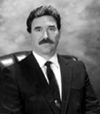 | Ed Clausen M.A
M.A. Audiologist, CCC-A is a licensed Audiologist under the Kansas Department of Health and Environment. He received his CCC-A in 1994 and serves as Company Audiologist for the 18 company offices of Midwest Hearing Aids, Inc. in Kansas. He holds memberships in the American Speech/Language and Hearing Association, the Kansas Speech/Language and Hearing Association, and the Kansas Hearing Aid Association. You may contact Ed at Midwest Hearing Aids corporate office in Wichita at 1 (800) 668-4055 or locally at (316) 264-2411. |
Audiology
2003-02-01 15:01:00
About hearing tests
QUESTION: What’s going to happen during a hearing test?
ANSWER: When you go for your appointment for a hearing test, you first may be asked to fill out a case history form (or this information may be gathered verbally when you talk to the professional). It may include some things you may consider personal, such as the number of different listening situations you are in, whether you work, what situations you struggle with, and how you feel about your hearing loss and hearing aids. This information is confidential. It is unethical for the professional to reveal this information to anyone- even your family- without your permission. This information is important to the professional because it will assist him/her in counseling you to prepare for your experience with hearing aids, and in working with you to select the most appropriate instruments for you. Then you will have the audiological evaluation. The professional will look in your ears with an otoscope to make sure you don't have too much earwax or a medical condition that would require a physician's care. You may have a tympanogram, which measures the movement of your eardrum. For this portion of the exam, a button is placed in your ear and you'll feel a pressure change, and perhaps some loud beeping. You don't have to do a thing for this test. Then you'll have an audiogram. You've probably taken a screening version of this test in the past; you listen for very soft beeping sounds and indicate you heard them by raising your hand, saying "yes", or pushing a button. This exam will be more thorough than what you've done before. You may also be asked to repeat a series of words for this test. Finally, you may be asked to define sounds as comfortably loud, loud, or uncomfortably loud. This is so that when the aids are set, that their loudness capability doesn't exceed your tolerance for loud sound.Then you'll talk again to your hearing healthcare professional. You'll discuss the results of the evaluation. If you do decide to purchase hearing instruments, then the professional will take impressions of your ears, like a dentist takes impressions of your teeth. You may be asked to get a doctor's signature that you are able to wear aids, or sign a form waiving that right. You may sign a contract with your professional that includes pricing, warranty, and servicing information. Finally, any questions you have should be answered completely before you leave.


